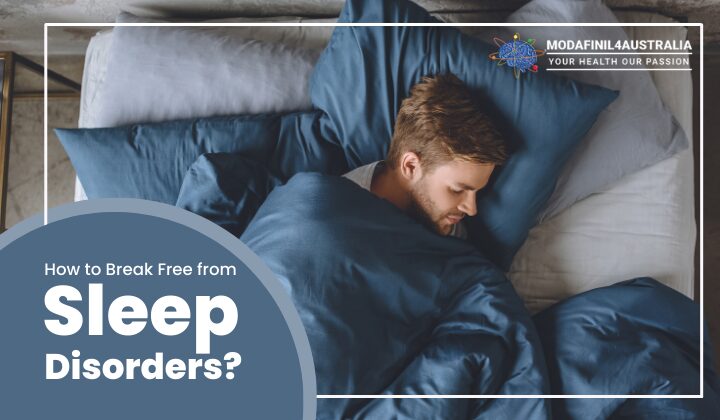
How to Break Free from Sleep Disorders?
Introduction
Sleep disorders affect millions of people worldwide, disrupting their daily lives and overall well-being. A good night’s sleep is essential for mental, physical, and emotional health, yet many struggle to achieve it. This guide explores the causes, types, and treatments for sleep disorders, offering practical steps to help you reclaim restorative sleep and live a more energized life.
Understanding Sleep Disorders
Sleep disorders encompass a range of conditions that hinder the ability to sleep well. From difficulty falling asleep to staying awake when needed, these issues can stem from various factors, including stress, medical conditions, and lifestyle habits. Addressing these challenges requires a comprehensive understanding of their root causes and symptoms.
Types of Sleep Disorders
- Insomnia: Insomnia is characterized by difficulty falling or staying asleep. It can be acute (short-term) or chronic, often linked to stress, anxiety, or underlying health issues.
- Sleep Apnea: Sleep apnea causes interruptions in breathing during sleep, leading to poor-quality rest and excessive daytime fatigue. Common symptoms include loud snoring and gasping for air.
- Restless Legs Syndrome (RLS): RLS involves an irresistible urge to move the legs, particularly during rest. This sensation disrupts sleep and can significantly impact quality of life.
- Narcolepsy: Narcolepsy is a neurological disorder characterized by sudden sleep attacks during the day. It can also cause sleep paralysis and vivid dreams.
Circadian Rhythm Disorders
These disorders occur when the body’s internal clock is out of sync with the environment, leading to irregular sleep-wake cycles.

Common Causes of Sleep Disorders
- Stress and Anxiety: Chronic stress and anxiety can overstimulate the brain, making it difficult to relax and fall asleep. Relaxation techniques and stress management can help mitigate this.
- Medical Conditions: Conditions like diabetes, heart disease, and chronic pain can interfere with sleep patterns. Treating these underlying issues often improves sleep quality.
- Poor Sleep Hygiene:Irregular sleep schedules, excessive screen time, and caffeine consumption before bed contribute to disrupted sleep.
- Lifestyle Factors: Habits like smoking, lack of exercise, and poor dietary choices can exacerbate sleep issues.
Identifying Symptoms and Getting Diagnosed
- Signs You Might Have a Sleep Disorder: Persistent fatigue, irritability, difficulty concentrating, and frequent waking during the night are common indicators of sleep disorders.
- When to See a Doctor: If sleep problems persist for more than a few weeks or severely impact daily functioning, consult a healthcare provider.
- Diagnostic Tools and Tests: Sleep studies, questionnaires, and wearable devices are often used to diagnose sleep disorders accurately.
Lifestyle Changes to Improve Sleep
- Establishing a Sleep Schedule: Go to bed and wake up at the same time daily, even on weekends. Consistency helps regulate your body’s internal clock.
- Creating a Restful Sleep Environment: Optimize your bedroom for sleep by minimizing noise, reducing light, and maintaining a comfortable temperature.
The Role of Diet and Exercise in Sleep Health
A healthy diet and regular physical activity support better sleep. Avoid heavy meals, caffeine, and alcohol close to bedtime.
1. Stress-Reduction Techniques
Techniques like progressive muscle relaxation, journaling, and breathing exercises can help calm your mind before bed. These methods not only prepare you for a good night’s sleep but also contribute to mental clarity and wakefulness during the day, ensuring a balanced cycle of rest and activity.
2. The Impact of Anxiety and Depression on Sleep
Mental health conditions often contribute to sleep disorders. Anxiety and depression can disrupt sleep patterns, leading to fatigue and reduced daytime productivity. By addressing these issues through therapy or counseling, individuals can enhance their overall well-being and maintain the alertness needed for daily tasks, indirectly promoting a sense of wakefulness.
3. Mindfulness and Relaxation Practices
Practicing mindfulness and meditation promotes relaxation, making it easier to fall asleep and stay asleep. These practices also cultivate a heightened sense of awareness and focus, which can translate into improved wakefulness and energy levels during waking hours, helping individuals tackle their day with clarity and purpose.
Treatment Options for Sleep Disorders

1. Cognitive Behavioral Therapy for Insomnia (CBT-I)
CBT-I is a structured, evidence-based approach that helps individuals identify and modify negative thoughts and behaviors affecting sleep.
2. Modalert 100 mg
Modalert 100 mg is a highly effective medication designed to combat excessive daytime sleepiness. It works by stimulating the central nervous system, helping individuals stay awake and alert throughout the day. This medication is particularly beneficial for those dealing with narcolepsy, obstructive sleep apnea, or shift work sleep disorder. Its long-lasting effects ensure sustained focus and productivity, making it a trusted choice for many. However, it’s essential to consult a healthcare provider to determine the appropriate dosage and ensure it aligns with your specific health needs.
3. Modasmart 400 mg
Modasmart 400 mg offers a potent solution for those struggling with disrupted sleep cycles and excessive fatigue. This medication not only promotes wakefulness but also enhances cognitive performance, allowing users to stay sharp and efficient throughout their day. Ideal for individuals managing irregular work schedules or sleep disorders, Modasmart 400 mg provides the energy boost needed to maintain focus and mental clarity. As with any medication, professional medical guidance is recommended to optimize its benefits and ensure safe usage.
Natural Remedies and Alternative Therapies
- Herbal Remedies and Essential Oils: Herbs like chamomile, valerian root, and lavender oil are known for their calming properties, promoting better sleep naturally.
- Yoga and Meditation for Better Sleep: Gentle yoga poses and meditation practices can relax the mind and body, preparing you for a peaceful night’s sleep.
- Acupuncture and Massage Therapy: These therapies improve circulation, reduce stress, and address physical discomfort, contributing to improved sleep quality.
- Aromatherapy for Sleep Enhancement: Using essential oils such as eucalyptus, sandalwood, or bergamot in diffusers or as part of a bedtime routine can create a calming environment, promoting restful sleep.
- Progressive Muscle Relaxation Techniques: This method involves tensing and then relaxing each muscle group in the body to reduce physical tension and prepare for a deeper sleep.
- Light Therapy for Sleep Regulation: For individuals struggling with circadian rhythm disorders, light therapy can help reset the internal clock, improving sleep-wake cycles and overall restfulness.
Conclusion
Breaking free from sleep disorders requires a combination of lifestyle changes, stress management, and, when necessary, medical interventions. For those seeking to promote wakefulness and combat excessive sleepiness, options like Modalert 100 mg and Modasmart 400 mg are available. To explore these solutions, visit modafinil-4-australia.com for more information and access to trusted products. With the right strategies and support, achieving restful sleep and wakeful days is within reach.






